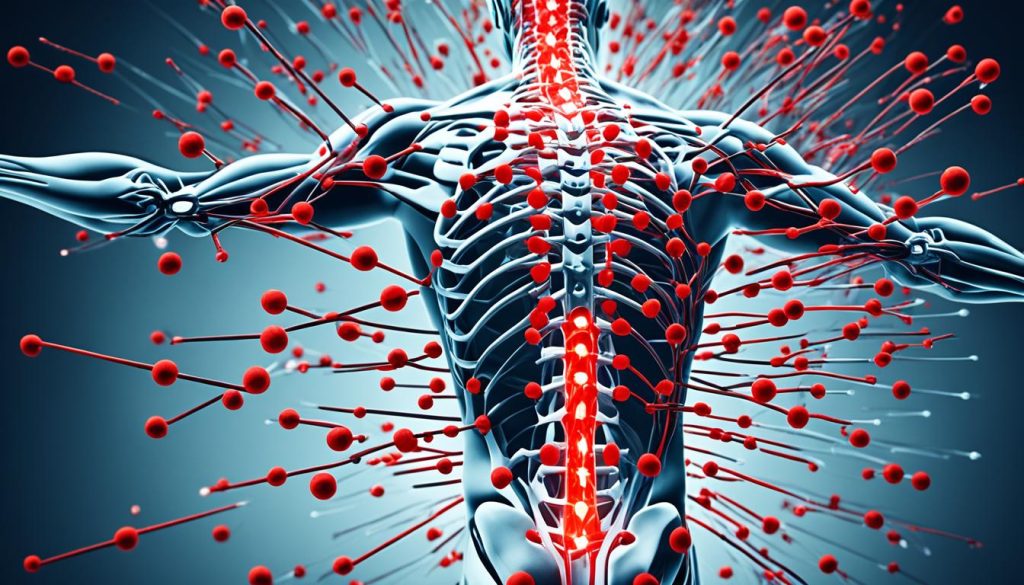Do you ever experience random sharp pains in different areas of your body? These sudden jolts of discomfort can be quite alarming and leave you wondering why they occur. In this article, we will explore the causes and treatment options for these sharp shooting pains, helping you gain a better understanding and find relief.
Nerve pain, also known as neuralgia or neuropathic pain, is often the culprit behind these sharp pains. It can manifest as shooting, stabbing, or burning sensations throughout the body. Nerve pain occurs due to damage or injury to the nerves that transmit pain signals or to the brain itself.
While it can be challenging to pinpoint the exact cause of these random sharp pains, several factors can contribute to their occurrence. Poor blood supply to the nerves, certain medications or toxins, and underlying medical conditions such as diabetes, multiple sclerosis, or cancer can all play a role.
Managing and treating nerve pain can be a complex process. However, several options are available to help alleviate the discomfort. These may include pain medications, non-medicine treatments such as exercise and acupuncture, and addressing underlying conditions. It is essential to consult with a healthcare professional for a proper diagnosis and personalized treatment plan.
In the following sections, we will delve deeper into the causes of these sharp random pains, understand their symptoms, explore the process of diagnosing nerve pain, and discuss treatment options and coping strategies. By the end of this article, you will have a comprehensive understanding of random sharp pains and be equipped with the knowledge to seek relief.
Why Do I Get Random Sharp Pains in Random Places?
If you’ve ever experienced random sharp pains in your body, you know how alarming and uncomfortable they can be. These sudden and intense sensations can occur in various areas and may leave you wondering why they happen in the first place.
Random sharp pains in the body can have several causes, including:
- Nerve damage or injury
- Poor blood supply to the nerves
- Certain medications or toxins
- Underlying medical conditions such as diabetes, HIV/AIDS, multiple sclerosis, and cancer
In some cases, the exact cause of these sharp pains may be unknown. However, it is believed to be related to nerve damage that occurred at some point. Nerve damage can lead to abnormal nerve signals that result in sharp pain sensations.
| Cause | Description |
|---|---|
| Nerve Damage or Injury | Damage or injury to the nerves can disrupt normal nerve function and lead to sharp pain. |
| Poor Blood Supply to the Nerves | Insufficient blood flow to the nerves can cause them to become irritated and result in sharp pain. |
| Certain Medications or Toxins | Some medications or toxins can affect nerve function and trigger sharp pain sensations. |
| Underlying Medical Conditions | Medical conditions such as diabetes, HIV/AIDS, multiple sclerosis, and cancer can damage nerves and cause sharp pains. |
If you experience random sharp pains, it is important to consult with a healthcare professional to determine the underlying cause and develop an appropriate treatment plan. They will perform a thorough evaluation, which may include physical examinations and diagnostic tests, to pinpoint the source of the pain.
Understanding the cause of the sharp pains is crucial in order to effectively manage and treat the condition. By addressing the underlying cause, healthcare professionals can develop a tailored treatment plan that may involve medications, physical therapy, lifestyle changes, or other interventions.

Remember, it is essential to seek professional medical advice to ensure the correct diagnosis and appropriate treatment for your specific situation. Random sharp pains can be debilitating, but with proper management, you can find relief and improve your overall quality of life.
Understanding Nerve Pain and its Symptoms
Nerve pain, also known as neuropathic pain, can manifest in various ways, often described as a sharp stabbing, sudden sharp, or burning sensation in the affected areas.
These sharp pains in the body can be accompanied by additional symptoms, such as:
- Sensitivity to touch or cold
- Numbness or weakness
- Aching pain
The intensity of the pain may vary, with some individuals experiencing constant discomfort while others may have intermittent episodes. Many people find that nerve pain worsens at night, interfering with sleep and daily activities.
It is vital to understand these sharp pain symptoms and their impact on overall well-being. Nerve pain can significantly affect one’s ability to function normally, affecting both work and personal life. Seeking medical assistance is crucial to determine the underlying cause and proper management of the condition.

Diagnosing Nerve Pain
To accurately diagnose nerve pain, a thorough evaluation by a healthcare professional is necessary. This typically involves a combination of assessing symptoms and conducting various tests and examinations. The goal is to identify the underlying cause of the nerve pain and develop an appropriate treatment plan.
Physical Examination and Symptom Assessment
During the diagnostic process, the healthcare professional will ask detailed questions about the symptoms experienced. This may include the type and location of the pain, the frequency and duration of episodes, and any factors that may trigger or alleviate the pain. A physical examination may also be conducted to assess neurological function and look for any visible signs of nerve damage or inflammation.
Tests and Imaging
Besides the physical examination, several tests and imaging studies may be performed to further diagnose nerve pain. These include:
- Blood tests: A comprehensive blood panel may be ordered to check for any underlying medical conditions, such as vitamin deficiencies or autoimmune disorders, that could be causing the nerve pain.
- Nerve conduction studies: This test measures the speed at which nerve signals travel, helping to identify any disruptions or abnormalities in nerve function. Electrodes are placed on the skin near the affected nerves, and a small electric current is applied to stimulate the nerve and evaluate its response.
- Imaging scans: Techniques like CT or MRI scans may be used to visualize the nerves and surrounding structures and detect any structural abnormalities or damage that could be contributing to the nerve pain.
By combining the information from symptom assessment, physical examination, and test results, healthcare professionals can make an accurate diagnosis and determine the most appropriate treatment plan for managing nerve pain.
Treatment Options for Nerve Pain
Nerve pain can be challenging to treat, but there are various options available to alleviate sharp pains and seek relief from the discomfort. Treatment approaches focus on addressing the underlying cause of the pain, managing associated conditions, and providing pain relief through a combination of medication and non-drug treatments.
Addressing the Underlying Cause
When it comes to nerve pain treatment, identifying and addressing the underlying cause is crucial. This may involve diagnostic tests, consultations with specialists, and targeted interventions. By targeting the root cause, healthcare professionals can develop an effective treatment plan specific to each individual’s needs.
Pain Relief Medications
To alleviate sharp pains, healthcare professionals may prescribe pain relief medications that target nerve pain specifically. Medications such as gabapentin and pregabalin are commonly used to reduce nerve pain. It’s important to follow the prescribed dosage and consult with a healthcare professional to ensure the correct and safe usage of these medications.
Non-drug Treatments
In addition to medication, non-drug treatments can play a crucial role in managing nerve pain. These treatments may include:
- Exercise: Regular exercise, under the guidance of a healthcare professional, can help improve blood circulation, strengthen muscles, and alleviate nerve pain.
- Relaxation Techniques: Practicing relaxation techniques such as deep breathing, meditation, and yoga may help reduce stress and promote overall well-being, potentially leading to reduced nerve pain.
Management of Associated Conditions
In some cases, nerve pain may be associated with other underlying conditions such as diabetes or vitamin deficiencies. Managing these conditions, in addition to addressing the nerve pain itself, can contribute to overall pain relief and improved quality of life. It’s important to work closely with a healthcare professional to develop an integrated treatment plan that covers all aspects of care.
It is crucial to keep in mind that the treatment of nerve pain is highly individualized. What works for one person may not necessarily work for another. It is essential to work with a healthcare professional to find the most suitable treatment plan that effectively manages and alleviates nerve pain.

| Treatment Options | Description |
|---|---|
| Pain Relief Medications | Prescribed medications that specifically target nerve pain, providing relief and managing symptoms. |
| Exercise | Regular physical activity that improves blood circulation, strengthens muscles, and helps alleviate nerve pain. |
| Relaxation Techniques | Practices such as deep breathing, meditation, and yoga that promote relaxation and reduce stress, potentially leading to reduced nerve pain. |
| Management of Associated Conditions | Treating underlying medical conditions, such as diabetes or vitamin deficiencies, that may contribute to nerve pain. |
Coping Strategies for Nerve Pain
Living with nerve pain can be challenging, but there are coping strategies that can help improve quality of life. Here are some strategies to consider:
Maintain a Healthy Lifestyle
Adopting a balanced diet and engaging in regular exercise can have a positive impact on managing nerve pain. A nutritious diet rich in vitamins and minerals can support nerve health, while exercise can help reduce inflammation, alleviate pain, and improve overall well-being.
Ensure Sufficient Sleep
Adequate sleep is crucial for managing nerve pain. It is important to establish a regular sleep routine and create a comfortable sleep environment. Relaxation techniques such as deep breathing exercises and mindfulness meditation can also promote better sleep.
Manage Stress
Stress can exacerbate nerve pain and make it more difficult to cope. Finding effective stress management techniques such as yoga, meditation, or engaging in hobbies and activities that bring joy and relaxation can help reduce stress levels and improve pain management.
Educate Yourself
Learning about nerve pain and pain management techniques can empower you to take control of your condition. Stay informed about the latest research, treatment options, and lifestyle modifications that may benefit you. Discuss any questions or concerns with your healthcare provider.
Seek Support
Dealing with nerve pain can be emotionally challenging. Consider seeking support through psychological treatments or support groups. Connecting with others who understand what you’re going through can provide validation, encouragement, and practical tips for coping with the pain.
Remember, everyone’s experience with nerve pain is unique, so it’s important to explore different coping strategies and find what works best for you. By implementing these strategies and seeking professional guidance, you can enhance your ability to cope with random sharp pains and improve your overall quality of life.
Conclusion
Experiencing random sharp pains in different areas of the body can be incredibly distressing, causing disruption to daily life. While the exact causes of these sharp shooting pains may not always be known, it is crucial to seek medical attention for a proper diagnosis and treatment. Nerve pain, resulting from various factors such as nerve damage, underlying medical conditions, and lifestyle, can be the culprit behind these sharp pains.
Treatment options for nerve pain include medications specifically designed to alleviate the symptoms, as well as non-drug treatments like exercise and relaxation techniques. Management of underlying conditions is also essential in effectively managing and reducing the occurrence of these sharp random pains. It is important to remember that coping strategies and support play a significant role in improving the overall quality of life for individuals dealing with nerve pain.
By adopting a holistic approach that combines medical treatments, lifestyle adjustments, and coping strategies, individuals can better manage and alleviate the sharp pain in different areas of their bodies. Seeking medical advice and support from healthcare professionals is crucial in understanding and addressing the causes of these sharp random pains. Remember, you don’t have to face these challenges alone – there are resources available to provide relief and a better quality of life.





